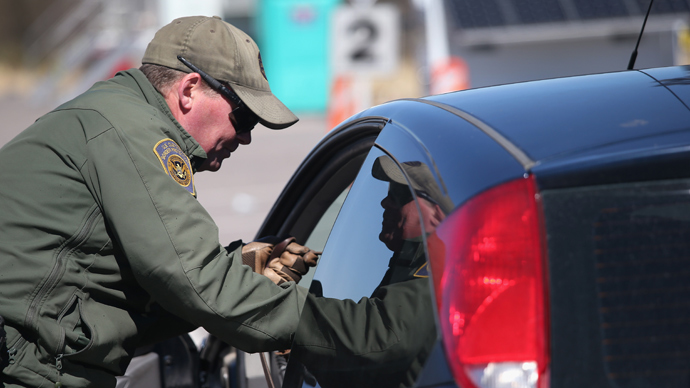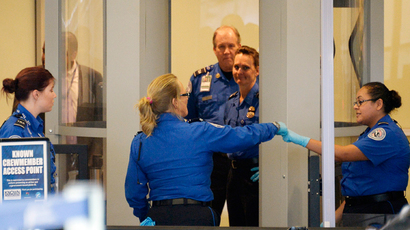Constitution 'exemption' zone spans 100 miles inland of US border– judge

A US federal judge has reaffirmed an Obama administration policy granting officials the authority to search Americans' laptops, citing a controversial premise that makes citizens within 100 miles of the border eligible for a police check.
District Judge Edward Korman made his ruling in New York on Tuesday, more than three years after the American Civil Liberties Union (ACLU) filed suit. The ACLU claimed that - since Americans put so much of their lives on their computers, cell phones, and other devices – border officials should have reasonable suspicion before sifting through someone's personal files.
Attorneys argued that searches conducted without reasonable suspicion are a violation of the Fourth Amendment, which protects against unreasonable search and seizure.
Not so, according to Judge Korman. In his decision Tuesday he argued that the area 100 miles inland falls under a “border exemption.”
“Laptops have only come into widespread use in the twenty-first century. Prior to that time, lawyers, photographers, and scholars managed to travel overseas and consult with clients, take photographs, and conduct scholarly research,” wrote Korman.
“No one ever suggested the possibility of a border search had a chilling effect on his or her First Amendment rights. While it is true that laptops make overseas work more convenient, the precaution plaintiffs may choose to take to 'mitigate' the alleged harm associated with the remote possibility of a border search are simply among the many inconveniences associated with international travel.”
The federal government has long conducted searches on travelers entering and leaving the US, but Congress expanded that policy by creating the Department of Homeland Security and setting up at least 33 checkpoints inside the country where people are stopped and asked to prove their citizenship.
The trouble is, the ACLU noted, that almost two-thirds of the population (197.4 million people) live within 100 miles of the US border. New York, Washington, Boston, San Francisco, Los Angeles, Miami, and dozens of other major metropolitan areas fall under the so-called “exemption” zone.
The civil-liberties advocacy group filed suit in 2010 on behalf of Pascal Abidor, a 29-year-old Islamic Studies student whose laptop computer was held for 11 days when he was traveling by Amtrak rail from Canada to his parents' home in New York.
Abidor was sitting in the train's cafe car when an officer forced him to take out his laptop then “ordered Mr. Abidor to enter his password,” the suit claimed. The computer contained images of Hamas and Hezbollah rallies and the agents, unmoved by Abidor's assertion the images were related to his studies, handcuffed the young man and kept him detained for three hours, questioning him numerous times.
Department of Homeland Security data indicates that 6,500 people had their devices search between 2008 and 2010 alone.
Catherine Crump, the ACLU attorney who argued Abidor's case, told Wired that the group was considering filing an appeal.
“We're disappointed in today's decision, which allows the government to conduct intrusive searches of Americans' laptops and other electronics at the border without any suspicion that those devices contain evidence of wrongdoing,” she said.
“Suspicionless searches of devices containing vast amounts of personal information cannot meet the standard set by the Fourth Amendment... Unfortunately, these searches are part of a broader pattern of aggressive government surveillance that collects information on too many innocent people, under lax standards, and without adequate oversight.”














